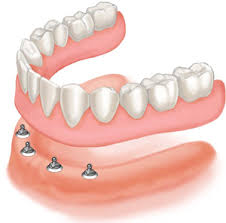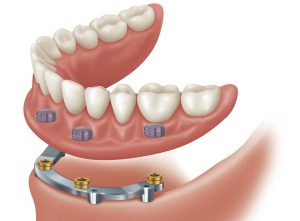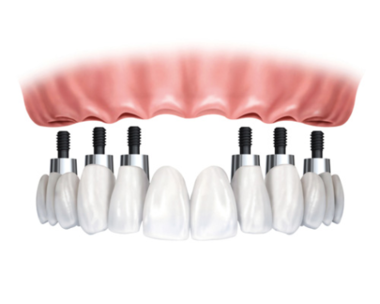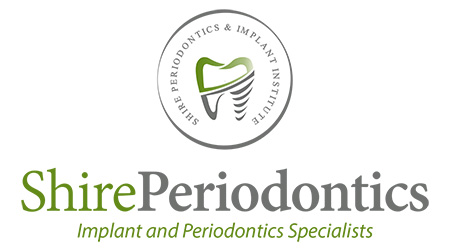The reasons many of our patients consider implant-supported dentures include:
- Difficulty having proper chewing function
- Lack of denture stability
- Too bulky dentures
- Phonetic/speaking difficulty with dentures
- Aesthetic issues
- Intolerance to having a bulky plate in their mouth (gag reflex)
- Having to use gooey denture adhesives
The reasons some people avoid implant-supported dentures:
- Cost
- Too scared of surgical procedures
- They have never been given the information tailored to their needs
Also, there are a variety of options:
1- Snap-in over-dentures on implants (removable):
It includes placement of between 2 to 6 implants (depending on the case) in the jawbone with the denture that snaps in firmly.
The denture can be taken out when necessary.

Advantages of snap-in over-denture option:
- The cheapest option
- While stays firm in the mouth, it can easily be removed by patient
- The most hygienic
- Easier to prevent future complications
- Easier to modify the design in future, if necessary
- Works best in the lower jaw with 2 to 4 implants
- Works best in upper jaw with 4 to 6 implants
- Can provide lip support with acrylic extension below the lip
- Less number of implants required compared to all other options
Disadvantage of snap-in over-dentures:
- It is not permanently fixed (this can be an issue for some people)
- The connecting part (ball and socket) may need maintenance over time due to wear and tear
- Still requires acrylic part around artificial teeth, sitting on the tissue
- It can still feel bulky for some patients (especially in upper jaw)
2- Over-denture on metal frame and bars connected to implants (removable):
It is more comfortable for patients since it gets most of the stability from the metal bar frame.
The bar is screwed onto the implants and the denture can still be removable.

Advantages of implant-supported over-denture with addition of metal bar:
- More stability of the denture
- More comfortable for patient
- Little gum to denture contact and friction required
- Is hygienic
- Less number of implants required compared to the fixed option (Option #3)
Disadvantages:
- More expensive than the first option
- The metal bar and frame may need further maintenance over long term
- Presence of a metal bar in the mouth when no denture is in may not feel pleasant
3- Fixed implant supported denture
This option includes placement of multiple implants (4 to 6 implants, depending on the length of the dental arch) and the teeth are screwed onto the implants.
There actually is no denture, the teeth are screwed onto the implants.
It remains fixed in the mouth and can only be removed by the clinician in-office.

Advantages of completely fixed option:
- No removal of denture required
- The amount of pink acrylic used is minimal (pink porcelain may be used)
- Minimal gum coverage and contact, therefore no gum friction occurs
- Stability is the best
Disadvantages of completely fixed option:
- More number of implants need to be placed
- Since more number of implants need to be placed, there is more chance of the need for bone and gum graft
- The most costly option
- The fact that it remains fixed, can be counter-productive for hygiene, therefore:
- This option should only be indicated for very motivated individuals with perfect oral hygiene
- It needs stricter maintenance and monitoring with the surgeon over long term
FAQs
- Almost all options can be complication-free short term. The key point is to plan the right choice and option for you, so that long-term, there are no complications.
- The correct option is always the one that is individually tailored and decided between you and your specialist. This is the first step in minimising long-term complications.
- Nevertheless, complications with any of the above options can arise. The only way to reduce the risk of complications is to have a very regular follow up and monitoring scheme in place. This usually includes a short visit to your specialist, 3 to 4 times a year.
- At each of these short appointments, your specialist surgeon will check every single component of your implant-supported denture. Also, your brushing and cleaning technique is reviewed. Your general medical and dental state is reviewed for any additional risk factors.
- If at any of the future appointments, any modification or adjustment is required, your surgeon and the restorative dentist will be responsible to advise you of that.
- At Shire Periodontics and Implant Institute, as long as you have followed up with your regular monitoring appointments, any extra work required can usually be considered as part of the warranty of the provided work.

